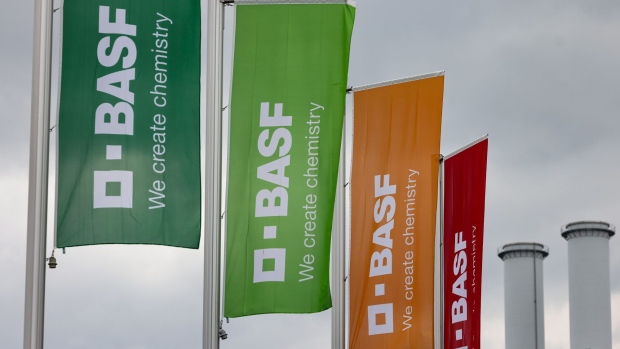Feb 23, 2024
BASF Sees Growth in China, Cuts European Costs By €1 Billion
, Bloomberg News

(Bloomberg) -- BASF SE sees earnings partially recovering this year as Europe’s biggest chemicals company deepens cost-cuts to counter elevated energy expenses and a slump in demand.
After returns plummeted last year, BASF expects growth in China to lift earnings before interest, taxes and special items to as much as €8.6 billion ($9.3 billion) this year, up from €7.7 billion, it said Friday.
BASF is also expanding cost-cutting measures at its Ludwigshafen, Germany, site, now planning to trim €1 billion from annual costs by 2026, including an unspecified number of job reductions.
Shares rose as much as 4%. The stock has declined roughly 20% since the Russian invasion of Ukraine two years ago, sending Germany and its industrial sector into an energy crisis.
Germany’s chemical industry has warned that it faces a deep recession, likely to last at least through this year, as high energy prices continue to weigh on production. To adjust, BASF has been slashing costs and cutting jobs in Europe and is carving out its battery materials and agriculture units to lift profit.
Weak demand nearly halved BASF’s sales and income before interest, tax and special items to €3.8 billion, the company said, confirming preliminary results it pre-reported in January.
Read More: BASF Earnings Crater as Higher Energy Costs Drag Down Output
BASF expects the weak global economic momentum to continue in 2024, with persistently high interest rates damping growth in the US and Europe. Demand for industrial goods will normalize only gradually, and growth in customer industries will be very moderate, Chief Executive Officer Martin Brudermüller said in a call with analysts. For Europe, BASF does not expect any growth momentum; the company sees US growth slowing gradually due to higher interest rates.
“Recovery in China remains uncertain, particularly with regard to the real estate sector and the development of the labor market,” Brudermüller said.
China’s chemical industry nevertheless is expected to rebound, and the majority of the company’s investments this year will go to its Verbund plant in China. Meanwhile, the company is trimming down in Europe.
“We will focus Ludwigshafen on supplying the European market,” Brudermüller said in a statement. “At the same time, we are driving forward our business in those regions of the world that are growing more dynamically and offer attractive conditions for investment.”
BASF plans to present its detailed plan for Ludwigshafen in the second half of this year.
Late last year, BASF said it would sell upstream assets of oil and gas producer subsidiary Wintershall Dea AG to UK’s Harbour Energy Plc in a $11.2 billion agreement. BASF expects a cash inflow of $1.56 billion upon closing, which is planned for the fourth quarter this year, the company said. It also has the option to sell Harbour Energy shares it receives as part of the transaction after a six-months lock-up period.
Read More: Shares in Harbour Energy Jump After $11 Billion Deal
Wintershall shareholders will not see a common dividend this year, Brudermüller said in a call with journalists.
(Updates with CEO comments beginning in seventh paragraph.)
©2024 Bloomberg L.P.


